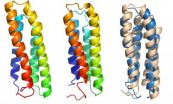(Press-News.org) Bottom Line: Widespread military adoption of damage control resuscitation (DCR) policies has shifted resuscitation practices at combat hospitals during conflicts.
Author: Nicholas R. Langan, M.D., and colleagues from the Madigan Army Medical Center, Tacoma, Wash.
Background: Operation Iraqi Freedom (OIF) and Operation Enduring Freedom (OEF) are the first prolonged conflicts the United States has been involved in since the Vietnam War. Medical and surgical advances have often emerged from the battlefields. One of the most important advancements in combat trauma care has been the adoption of DCR, with the basic principles of early, balanced administration of blood products, aggressive correction of coagulopathy (when blood will not clot) and the minimization of crystalloid fluids (intravenous fluids). Adoption of DCR has been credited with improvements in survival among severely injured patients.
How the Study Was Conducted: Authors analyzed injury patterns, early care and resuscitation among soldiers who died in the hospital before and after implementation of DCR policies. They reviewed data from the Joint Theater Trauma Registry (2002-2011) for combat hospitals. In-hospital deaths were divided into pre-DCR (before 2006) and DCR (2006-2011).
Results: Of 57,179 soldiers admitted to a forward combat hospital, 2,565 (4.5 percent) subsequently died at the hospital. The majority of patients (74 percent) were severely injured and 80 percent died within 24 hours of admission. DCR policies was associated with a decrease in average 24-hour crystalloid infusion volume and increased use of fresh frozen plasma. The average ratio of packed red blood cells to fresh frozen plasma changed from 2.6:1 during the pre-DCR period to 1.4:1 during the DCR period. There was a shift in injury patterns with more severe head trauma cases in the DCR group.
Discussion: "Patients who died in a hospital during the DCR period were more likely to be severely injured and have a severe brain injury, consistent with a decrease in deaths among potentially salvageable patients."
INFORMATION:
(JAMA Surgery. Published online July 16, 2014. doi:10.1001/jamasurg.2014.940. Available pre-embargo to the media at http://media.jamanetwork.com.)
Editor's Note: Please see the article for additional information, including other authors, author contributions and affiliations, financial disclosures, funding and support, etc.
Commentary: Let's Close Performance Improvement Loop on Adverse Outcomes
In a related commentary, John B. Holcomb, M.D., of the University of Texas Health Science Center at Houston, writes: "The War on Terrorism will not be over for a long time. Command attention at all levels on combat casualty care must remain a laser focus or our casualties will not have the best possible outcome."
(JAMA Surgery. Published online July 16, 2014. doi:10.1001/jamasurg.2014.961. Available pre-embargo to the media at http://media.jamanetwork.com.)
Editor's Note: Please see the article for additional information, including other authors, author contributions and affiliations, financial disclosures, funding and support, etc.
Media Advisory: To contact corresponding author Matthew J. Martin, M.D., call Carrie Bernard at 253-968-2968 or email carrie.bernard@us.army.mil. To contact commentary author John B. Holcomb, M.D., call Rob Cahill at 713-500-3042 or email Robert.Cahill@uth.tmc.edu.
Study examines shift in resuscitation practices in military combat hospitals
2014-07-16
ELSE PRESS RELEASES FROM THIS DATE:
Study: Smoking may contribute to suicide risk
2014-07-16
AUDIO:
People who smoke cigarettes commit suicide at higher rates than those who don't smoke. That's been known for years, but most scientists assumed the reason was that smoking rates were...
Click here for more information.
Cigarette smokers are more likely to commit suicide than people who don't smoke, studies have shown. This reality has been attributed to the fact that people with psychiatric disorders, who have higher suicide rates, also tend to smoke. But new research ...
Cell membrane proteins give up their secrets
2014-07-16
HOUSTON – (July 16, 2014) – Rice University scientists have succeeded in analyzing transmembrane protein folding in the same way they study the proteins' free-floating, globular cousins.
Rice theoretical biologist Peter Wolynes and his team at the university's Center for Theoretical Biological Physics (CTBP) have applied his energy landscape theory to proteins that are hard to view because they live and work primarily inside cell membranes.
The method should increase the technique's value to researchers who study proteins implicated in diseases and possibly in the ...
Are ants the answer to carbon dioxide sequestration?
2014-07-16
Boulder, Colo. – A 25-year-long study published in Geology on 14 July provides the first quantitative measurement of in situ calcium-magnesium silicate mineral dissolution by ants, termites, tree roots, and bare ground. This study reveals that ants are one of the most powerful biological agents of mineral decay yet observed. It may be that an understanding of the geobiology of ant-mineral interactions might offer a line of research on how to "geoengineer" accelerated CO2 consumption by Ca-Mg silicates.
Researcher Ronald Dorn of Arizona State University writes that over ...
Study: Robot-assisted surgery for prostate cancer controls the disease for 10 years
2014-07-16
DETROIT – Robot-assisted surgery to remove cancerous prostate glands is effective in controlling the disease for 10 years, according to a new study led by researchers at Henry Ford Hospital.
The study also suggested that traditional methods of measuring the severity and possible spread of the cancer together with molecular techniques might, with further research, help to create personalized, cost-effective treatment regimens for prostate cancer patients who undergo the surgical procedure.
The findings apply to men whose cancer has not spread beyond the prostate, and the ...
Seeing the glass as half full: Taking a new look at cognition and aging
2014-07-16
From a cognitive perspective, aging is typically associated with decline. As we age, it may get harder to remember names and dates, and it may take us longer to come up with the right answer to a question.
But the news isn't all bad when it comes to cognitive aging, according to a set of three articles in the July 2014 issue of Perspectives in Psychological Science.
Plumbing the depths of the available scientific literature, the authors of the three articles show how several factors — including motivation and crystallized knowledge — can play important roles in supporting ...
Fair cake cutting gets its own algorithm
2014-07-16
The next time your children quibble about who gets to eat which part of a cake, call in some experts on the art of sharing. Mathematician Julius Barbanel of Union College, and political scientist Steven Brams of New York University, both in the US, published an algorithm in Springer's The Mathematical Intelligencer by which they show how to optimally share cake between two people efficiently, in equal pieces and in such a way that no one feels robbed.
The cut-and-choose method to share divisible goods has been regarded as fair and envy-free since Biblical times, when ...
Borneo deforested 30 percent over past 40 years
2014-07-16
Forest cover in Borneo may have declined by up to 30% over the past 40 years, according to a study published July 16, 2014 in the open-access journal PLOS ONE by David Gaveau from the Center for International Forestry Research, Indonesia, and colleagues.
The native forests of Borneo have been increasingly impacted by logging, fire, and conversion to plantations since the early 1970s. Borneo lacks island-wide forest clearance and logging documentation, making forest conservation planning difficult, especially for selectively logged forests that have high conservation potential ...
Whale shark fringe migration
2014-07-16
At the fringe of the whale shark range, the volcanic Azore islands may play an increasing role for the north Atlantic population as sea surface temperatures rise, according to a study published July 16, 2014 in the open-access journal PLOS ONE by Pedro Afonso from University of the Azores and colleagues.
Whale sharks prefer tropical waters in the range of 26-30º C, but studies have shown that this large filter-feeding shark seasonally aggregates at highly productive coastal sites, sometimes at the edge of their preferred water temperature range. Whale sharks have been ...
Indus river dolphin's declining range
2014-07-16
Removal of river water for irrigation and habitat fragmentation by irrigation dams were shown to be the principal factors contributing to the decline of the Indus river dolphin, according to a study published July 16, 2014 in the open-access journal PLOS ONE by Gill Braulik from the Wildlife Conservation Society and University of St. Andrews and colleagues.
Many freshwater marine mammals are endangered due to rapidly degrading habitat and conservation of these megafauna species depends on maintaining intact habitat. This study used historical range data and information ...
Transplanting gene into injured hearts creates biological pacemakers
2014-07-16
LOS ANGELES (STRICTLY EMBARGOED UNTIL 2 P.M. EDT ON JULY 16, 2014) – Cardiologists at the Cedars-Sinai Heart Institute have developed a minimally invasive gene transplant procedure that changes unspecialized heart cells into "biological pacemaker" cells that keep the heart steadily beating.
The laboratory animal research, published online and in today's print edition of the peer-reviewed journal Science Translational Medicine, is the result of a dozen years of research with the goal of developing biological treatments for patients with heart rhythm disorders who currently ...


